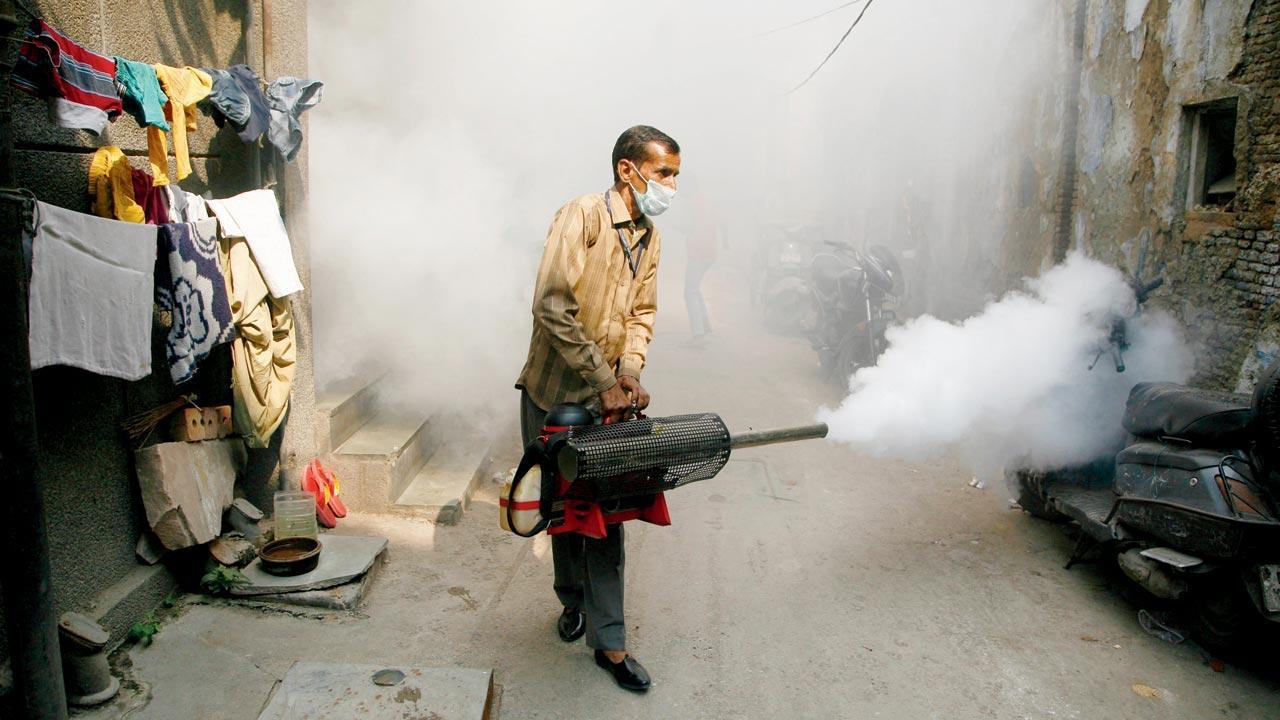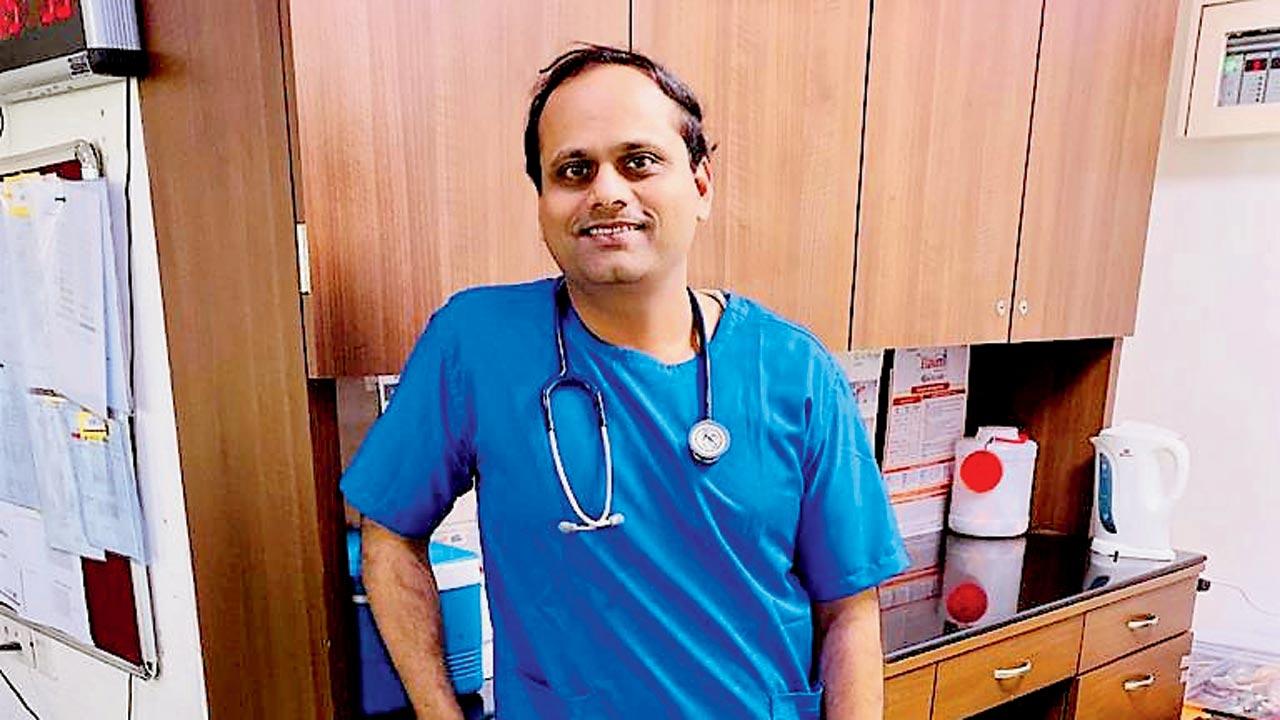Amid the re-emergence of this variant after a long gap, they advise focusing on early detection and efforts to curb spread of mosquitoes

A civic worker fumigates a slum area in the city. Representation pic
As authorities stay focussed on the Covid-19 pandemic, another health challenge has emerged from different parts of the country including Maharashtra — steep rise in dengue subtype 2, considered a more severe form of the disease. Well-known virologist Dr Jacob John, who has done extensive research on it, said this is the first time after a long gap such an outbreak has surfaced.
ADVERTISEMENT
Dr Wiqar Shaikh, Professor of Medicine, Grant Medical College and Sir J.J. Group of Hospitals, said 11 states have so far reported a spike in dengue cases. He said the viral infection, spread by the Aedes mosquito, has 4 variants — DENV-1, DENV-2, DENV-3 and DENV-4. Headaches, shooting pain in eyeballs, nausea, Joint, bone or muscle pains and rashes are among its common symptoms.
 Dr Santosh Bansode, HoD, Emergency Medicine, Wockhardt Hospital, Mumbai Central
Dr Santosh Bansode, HoD, Emergency Medicine, Wockhardt Hospital, Mumbai Central
Even if a person develops immunity to one particular serotype after getting infected by it, there are chances of getting the other infections. “It is possible to be infected 4 times and a repeat infection increases the risk of complications. The current infection sweeping across India is caused by DENV-2, which can trigger a high number of cases and increased complications.” This infection can cause Dengue Shock Syndrome, in which the blood pressure becomes dangerously low, and Dengue Hemorrhagic Fever, which results in severe bleeding. Dr Shaikh said DENV-2 is known to be more lethal in children.
Management of dengue patients is supportive and symptomatic, he said. “As in all viral infections, early diagnosis is the key and early and prompt medical care can reduce the death rates to less than 1 per cent,” he said, adding that the disease claims about 40,000 lives in India every year. “DENV-2 cases this year may surpass all previous dengue records.” Cautioning against the commonly used ‘papaya extract’ for dengue patients, he said there is no authentic and scientific evidence to recommend it. Dr Santosh Bansode, HoD, Emergency Medicine Wockhardt Hospitals, Mumbai Central, said studies have shown that serotype 2 infects and invades mosquitoes at a faster rate. “That’s why if it starts spreading in humans, we can get a rise in the number of dengue cases, which if spread, may become a challenging situation for us to handle. We are already fighting against covid and we don’t want another epidemic now,” he said.
Dr Bansode said prevention is the best way to control dengue. “General population must be made aware of this variant and overall dengue. Vector control should be done aggressively. Use of mosquito repellents should be encouraged. Doctors should also suspect and investigate fever patients to rule out dengue. Early detection is important in treating dengue,” said Dr Bansode. He added, “Blood banks should be alerted to keep adequate reserves of blood components, especially platelets.”
Fast rise of DENV-2 and DENV-4
According to Dr Subhash Hira, Professor of Global Health at the University of Washington-Seattle and an expert of infectious diseases, DENV-2 and DENV-4 variants have been spreading more rapidly in India for the past few years.
He said, “The conservational treatment of dengue by hydrating and managing fever works well for most patients, except those who progress to dengue haemorrhagic fever and dengue shock syndrome. The latter may benefit from monoclonal antibodies that are presently in experimental use. Like many vector-borne infectious diseases, dengue is preventable by eliminating day-time biting Aedes aegypti mosquitoes that breed in fresh-water stagnated sites.”
Top virologist speaks
Vellore-based top virologist Dr Jacob John said, “When health experts say that high prevalence of serotype 2 dengue virus is unprecedented, the fact is that type 2 was the predominant virus in Western UP during 1969 and 1970. In fact, the dengue virus type 2 was first isolated in India [in Vellore] in 1964. Since then, types 1, 2, 3 and 4 had taken turns in causing outbreaks in different parts of the country.”
He said the 1996 Delhi dengue outbreak was with type 2. “In recent years, types 1 and 3 have dominated. So the long absence of type 2 is the reason why it has now become dominant,” explained Dr John.
“Dengue by itself is not life-threatening, but Dengue Haemorrhagic Syndrome is and dengue 2 has been associated more frequently than others with DHS. If diagnosed early and treated correctly, DHS need not cause death,” he concluded.
11
No. of states that have seen a spike in cases
 Subscribe today by clicking the link and stay updated with the latest news!" Click here!
Subscribe today by clicking the link and stay updated with the latest news!" Click here!







